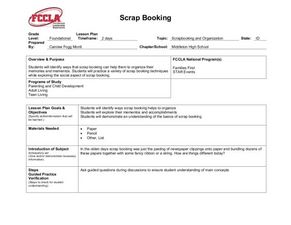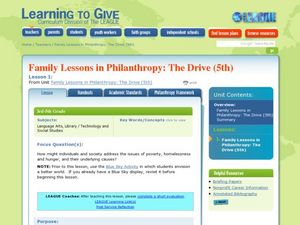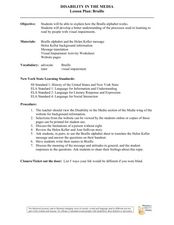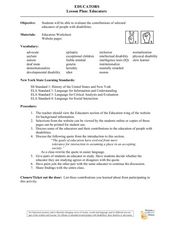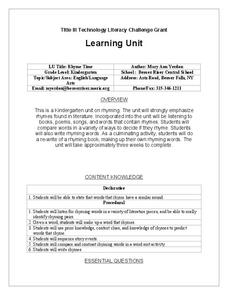Curated OER
Create Your Perfect Dog!
Students create the perfect dog. They read and discuss Clifford's Sports Day and identify Clifford's personality traits. After listening to the story, they discuss their concept of a perfect dog with their families and draw pictures of...
Curated OER
Poetry for Home: Homelessness
Students read a poem to learn about homelessness. In this poetry lesson, students make a list of words about their home and then feelings about their home. Students read the poem 'When I Think Home' and then write their own version of...
Curated OER
Scrap Booking
Young scholars complete scrap booking activities. In this scrap booking instructional activity, students discuss scrapbooking and make a list of times to include in a scrapbook. Young scholars research scrapbook ideas online and bring in...
Curated OER
Family Lessons in Philanthropy: The Drive
Students investigate family philanthropy. In this family philanthropy lesson, students review vocabulary such as community, family, service, volunteer, tradition, and caring. They listen to Valerie Flournoy's, The Patchwork Quilt. They...
Curated OER
100 Irregular Plural Nouns in English
In this irregular plural nouns worksheet, students fill in the blanks in this irregular plural noun chart. Students also add their own examples of irregular plural nouns that are not listed on the chart.
Curated OER
Pinckney Benedict's "The Sutton Pie Safe" from Town Smokes
Students read Pinckney Benedict's "The Sutton Pie Safe" to learn about family symbols and social commentary. For this close reading lesson, students read four journal prompts for the story and answer the listed questions for each section.
Curated OER
Understanding Folklife and Folklore
Student examine the basic characteristics of folklore. In this folklore lesson, students complete activities to identify two kinds of folk, folk groups, and folklife. Students list daily activities in their home, identify folk groups...
Curated OER
Sentence Game
Students explore and study what they already know about grammar and sentence structure to reinforce their mastery of assessing the eight parts of speech. They match a set of colored word cards with their correct part of speech and create...
Curated OER
Responsibility and Jobs
Students identify community helpers. In this philanthropy lesson, students read Strega Nona and identify different characters' responsibilities in the story. Students use character traits to describe the main characters and make a list...
Curated OER
ESL Mi Familia- Family Identification Worksheet
In this Spanish/English family member identification matching worksheet, students match 7 black and white clip art pictures of family members to their Spanish and English names.
Curated OER
Advocates for Disabilities
Students research people who have contributed to making life better for the disabled. In this advocacy lesson students enter the names of advocates on cards and divide into groups. Students complete a worksheet based on the advocates...
Curated OER
Disability in the Media Lesson Plan: Braille
Students determine the workings of the Braille alphabet and how people with visual impairments learn how to use it. In this Braille lesson, students study the associated vocabulary, read about Helen Keller, and complete associated...
Curated OER
The Catcher in the Rye: KWHL Strategy
Teen depression is the focus of a KWHL activity used to consider the problems Holden Caulfield faces. Groups develop topics, research them, and use what they have learned to analyze Holden's character. A KWHL template, and a completed...
Novelinks
Walk Two Moons: Anticipation Guide
Before you begin a unit on Sharon Creech's Walk Two Moons, introduce class members to the literary themes of the book with an anticipation guide. As they read through ten sentences that address different aspects of the plot, learners...
Curated OER
Where the Red Fern Grows: A 4th Grade Literary Focus Unit
Fourth graders explore the human and animal connection along with the idea that death is a part of the life cycle. They read "Where the Red Fern Grows." Students examine the feelings and emotions surrounding death and they discover the...
Curated OER
Reading Scavenger Hunt
For this scavenger hunt worksheet, students practice several reading skills by hunting for the words listed on their clipboard worksheet.
Curated OER
Lexicheck
Pupils review the production or reception of word usage. They practice using vocabulary tips in both written and spoken usage. Students incorporate a variety of ways to comprehend unknown words.
Teaching Tolerance
Community Newsletter
What does it take to develop and publish a newsletter? Young academics create a newsletter with original artwork for their school or community. They explore social justice themes and spread messages of tolerance and inclusion. Scholars...
Curated OER
The Blend Game
Students become stars of their own educational video in this project that allows learning in several different styles.
Curated OER
Who's in the Shed?
Second graders examine the cover of the book, WHO'S IN THE SHED? and talk about the animals portrayed and the noises they make. They then read the book as a class, looking through the peepholes and making predictions.
Curated OER
Educators
After viewing selections from a website and discussing the role of the teacher in educating the disabled, students work in pairs. They analyze the work of an educator and relate the work to a given quote, then decide if that quote fits...
Mississippi State University
The Five Senses
Your learners engage their five senses every day without knowing it. Help them identify their experiences and extend their understanding with a month full of lessons designed for the five senses. Kids focus on a different sense every...
Curated OER
Family Communication Style
Eighth graders explore the different ways that families communicate with each other. After a lecture/demo, 8th graders generate a list of relationships that might benefit from practice in the art of conversation and communication.
Curated OER
Rhyme Time
Students listen to a variety of stories and identify rhyming words. They sequence events in the story and generate rhymes of their own. They sort words by rhyming families and write rhymes of their own.




